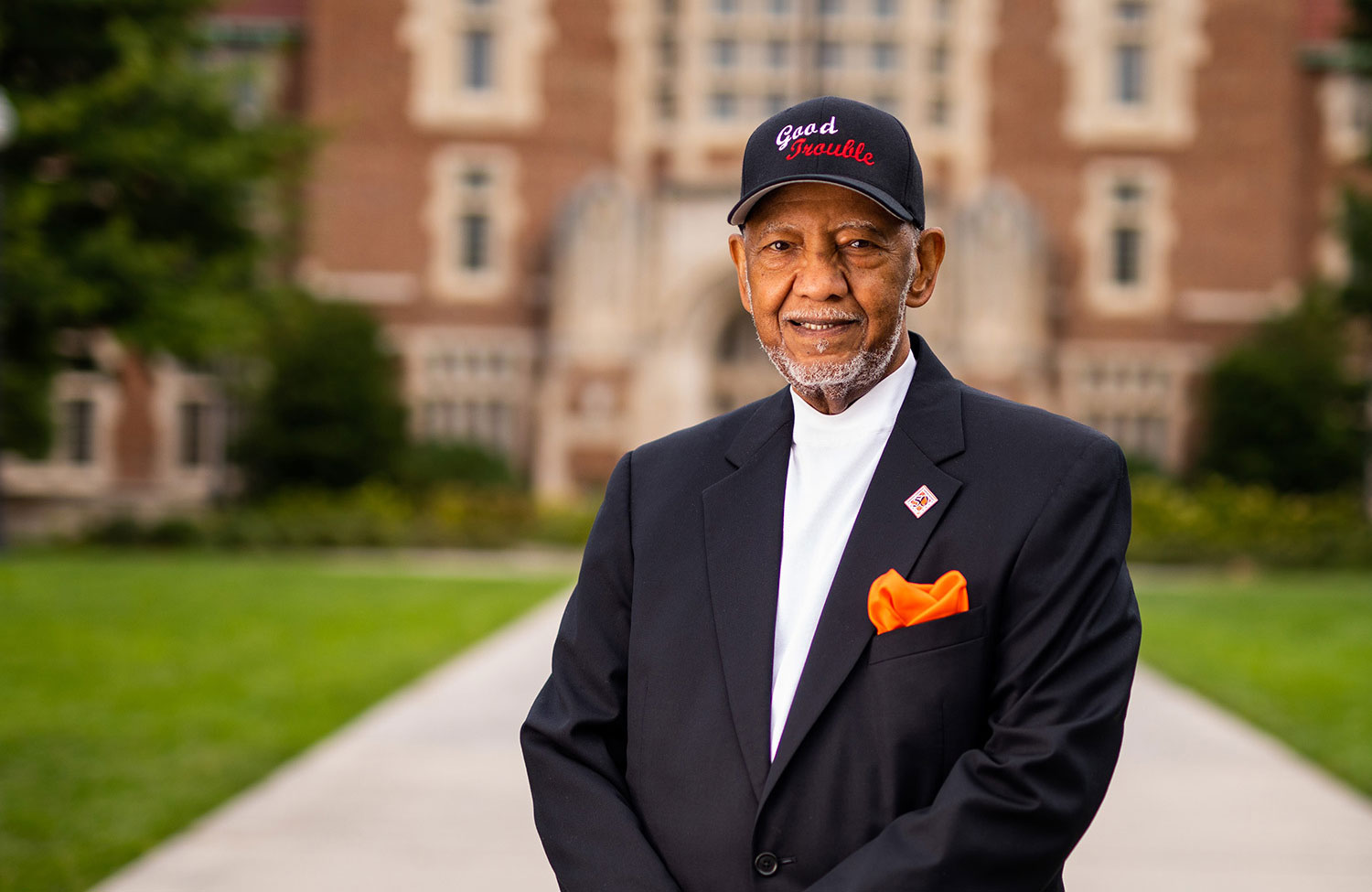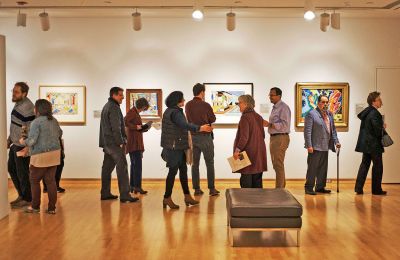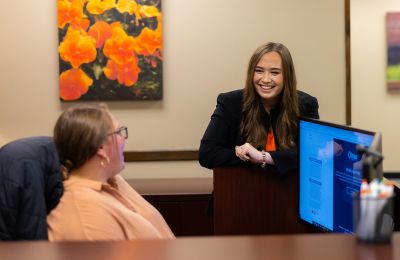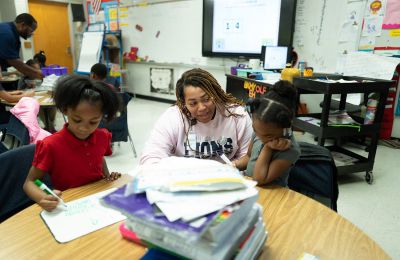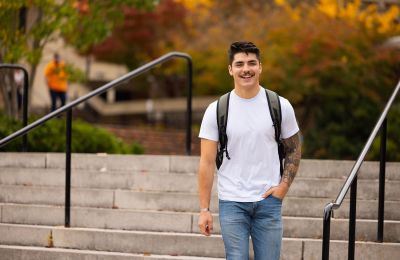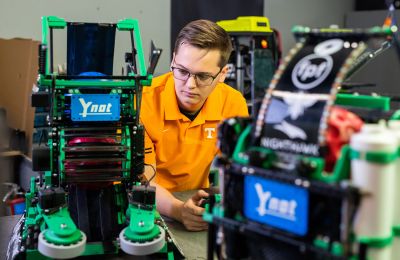Theotis Robinson Jr. had written out his life’s plan by the time he entered high school: college, law school, military, politics.
“After the Senate, I’d be elected president, then appointed to the Supreme Court,” says Robinson, laughing at the memory.
The plan was ambitious, especially for a young Black man in the 1950s. Robinson’s parents were working people who had moved to Knoxville from small rural communities in Georgia and Mississippi. For years, his mother, Alma, worked making salads at restaurants and his father, Theotis Sr., cooked for athletes on campus.
“Neither had much formal education,” Robinson says. “The doors of opportunity weren’t opened for them.”
But they believed in their son’s dreams. While those dreams did not take him to the White House, they fueled Robinson’s path through the early obstacles he faced to arrive at the place of influence he occupies today as a local civil rights icon and a foundational figure in the University of Tennessee, Knoxville’s history—the first Black undergraduate admitted, a former vice president for equity and diversity for the UT System, and, in 2019, the recipient of both an honorary doctorate in social work and a Distinguished Alumnus award for his decades of commitment and service to racial equality.
Now Robinson is investing in the dreams of another generation by establishing a scholarship fund for incoming first-year students at UT. The Theotis Robinson Jr. Flagship Pathway Scholarship Endowment will support students who graduate from one of 38 designated Flagship high schools in Tennessee. It will be awarded for up to four years and can be bundled with other state and university scholarships.
“This helps bring it full circle,” says Tyvi Small, vice chancellor for diversity and engagement and a close friend and mentee of Robinson’s. “Historically, Theotis helped lay the foundation for us.
“If it hadn’t been for his bravery, tenacity, and his will, many of us wouldn’t be working here, studying here, and contributing to the phenomenal tapestry that is UT. Now, in the present, he’s still providing opportunity and access through this generous gift.”
A History of Overcoming
Robinson’s relationship with the university spans more than six decades. It started when he was nine years old and his father, then a cook for UT’s scholarship athletes, took him to Shields–Watkins Field to watch football games.
Father and son watched together from the segregated section. That divide between Black and white was an unshakeable feature of Robinson’s everyday life. He attended an all-Black school, Austin High (which later merged with the white school, East, to become what is now Austin-East High School). He dreamed of becoming president of the United States, but as a Black man faced obstacles to voting and holding political office.
That didn’t stop Robinson. He was chasing a dream. And he wasn’t alone.
“There were so many people who paved the way for me,” Robinson says. “We’re always building on the accomplishments of others.”
There were his parents, who eventually started a business of their own, Five Points Restaurant in east Knoxville, and ran it for 12 years until his mother’s death. There was Ms. Drake, Robinson’s fifth-grade teacher, who had taught him and his classmates at Green School (now Green Middle Magnet Academy) to memorize the 50 states, their capitals and most important industries, and the branches of government and their functions. And there were the Black icons—Nat Turner, Frederick Douglass, Joe Louis, Jackie Robinson, Martin Luther King Jr., Malcolm X—that Robinson had read about in books and watched on film during school assemblies.
It was their spirits he carried with him as he fought for admission to UT in 1960.
That summer, Robinson had participated in civil rights marches and lunch counter sit-ins in downtown Knoxville—even once bringing his father along (“Son, I support what you’re doing, but I can’t go back,” his father told him after watching the students withstand abuse with nonviolence. “If somebody calls me the n-word or hits me, I’m going to do something about it.”)
After graduating from high school, Robinson had been offered a scholarship to Knoxville College, a historically Black institution. But the college did not offer a political science major. And Robinson was on a journey toward political office.
In the winter of 1961, after first being denied admission due to the color of his skin, then meeting and debating for months with the administration, Robinson started his political science degree at UT. He was one of just three Black undergraduates—the others were Charles Blair and Willie Mae Gillespie—who joined a small group of Black graduate and law students at UT.
“I had a high profile,” Robinson says. “But I was here to be educated. I took all sorts of courses: political science, journalism, writing, economics, business. It broadened my educational underpinnings to do the work that I did afterward.”
In 1970, Robinson became the first Black person to be elected to Knoxville City Council in more than 50 years. He fought for Black inclusion as vice president of economic development for the 1982 World’s Fair, which provided Knoxville’s indelible Sunsphere. Robinson was later hired by UT, where he spent 25 years in various professional, service, and leadership roles until his retirement in 2014.
The Challenges Facing Students
With a life as rich in achievement as Robinson’s, it’s easy to focus on what came later. But as a college student, he faced many of the same challenges as his contemporaries.
In the summer of 1962, Robinson, a married commuter student with kids, paused his studies at UT to take a job as a sheet metal worker at Oak Ridge National Laboratory. Four years later, he left for Y-12 National Security Complex where he worked for a federal contractor. All the while, Robinson never stopped studying. He took night classes at the university up until he was elected to City Council. In 1989, he began teaching political science at UT before serving in various other roles at the university.
“Education is the underpinning for everything you want to do in life,” Robinson says. “An educational experience prepares students for a more robust life as citizens.
“Our communities need people who attend PTA meetings, join the chamber of commerce, and run for public office. We need people who are civically engaged.”
For Robinson, students should be free to study without worrying about the cost or the debt they’re accruing to do so. That is why he was moved to establish a scholarship fund.
In his time as UT System vice president for equity and diversity, Robinson also worked to address some of the disparities facing men of color, who are less likely to graduate than their female peers. He helped establish campus chapters of Brother to Brother, a national organization that aims to improve the educational experience and graduation rates of male African American and Latino students. The program did not continue after his departure, but earlier this year the university established the UT Success Academy, which works toward the same purpose by providing students with academic support and opportunities for experiential learning and community building. Participating students receive a $2,000 scholarship and funding for study abroad.
“A lot of our students grow up with dreams of going to college, but the financial support is not there for them and their families,” says Aaron Dixon, director of the academy and a 2019 graduate of the College Student Personnel program. “We’re giving them a scholarship. We’re connecting them with mentors and student organizations on campus and teaching them what it means to navigate the workplace as men of color. And we’re hopefully helping them to set a solid foundation for who they are and where they want to be by the time they graduate.”
Like many of the university’s other student support initiatives, the academy, which looks to recruit 200 new undergraduates a year, is a piece of Robinson’s legacy of making campus more welcoming for all. Dixon, Small, and so many others who make up today’s Volunteer community stand on his shoulders—much as Robinson stood on the shoulders of those who came before him.
“My hope is that by attending UT, students will not only be prepared for their life’s work in the careers they choose,” Robinson says. “But I hope their time at the university also enhances their ability to contribute back to society once they leave.”
